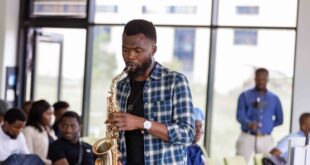![]()
Follow the rules, work with us, His Excellency Thomas Amolo appeals to Kenyans in Germany
![]()
The African Courier interviewed Kenya’s new Ambassador Extraordinary and Plenipotentiary to Germany, His Excellency Thomas Boniface Amolo, after he presented his Letter of Credence to President Frank-Walter Steinmeier in Berlin on Thursday, 11 March.
In the exclusive chat, Ambassador Amolo, who is also concurrently accredited to Bulgaria and Romania, talks about the state of Kenya-German relations, the Covid-19 challenges, Kenya’s international responsibilities and how he plans to engage Germans to drive his country’s agenda. Moreover, the ambassador addresses the complaints of Kenyans living in Germany and expresses his expectations of them, among other issues.
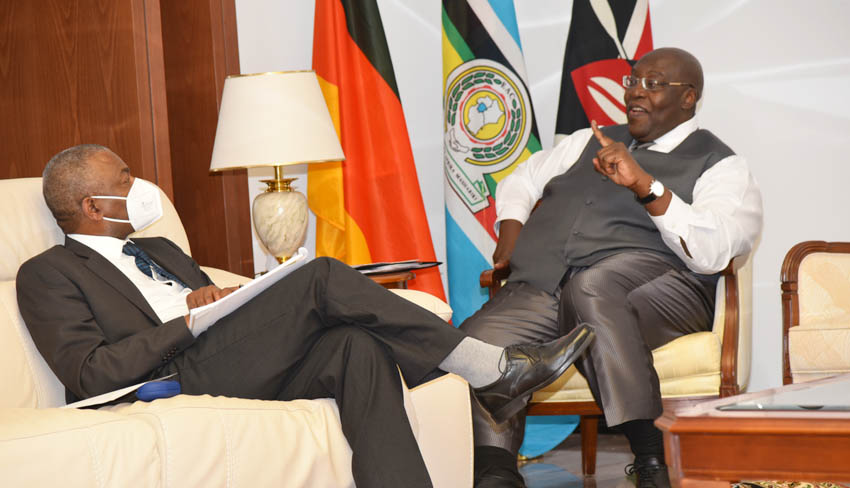
His Excellency Thomas Boniface Amolo (right) and Femi Awoniyi, Publisher of The African Courier during the exclusive interview
![]()
INTERVIEW
The African Courier: Your Excellency, congratulations on the successful presentation of your credentials to President Frank-Walter Steinmeier. What did you discuss with the German leader during your interaction with him today?
Ambassador Amolo: We talked about rules-based multilateralism. I spoke about the challenge of terrorism in our region but also in the Sahel and why we need to work together to address these challenges.
I spoke about Kenya’s Chairmanship of the AU Peace and Security Council, the Organisation of African, Caribbean and Pacific States and the East African Community as well as its membership of the UN Security Council.
I spoke about the need for German leadership supporting Kenyan leadership in the region.
I thanked him for COVAX [a global initiative aimed at ensuring global access to coronavirus vaccines, especially in Africa, Latin America and Asia] and we agreed on the need for it to be expanded.
We spoke about bilateral co-operation and I thanked him for TVET [technical and vocational education and training]. We talked about trade and tourism…
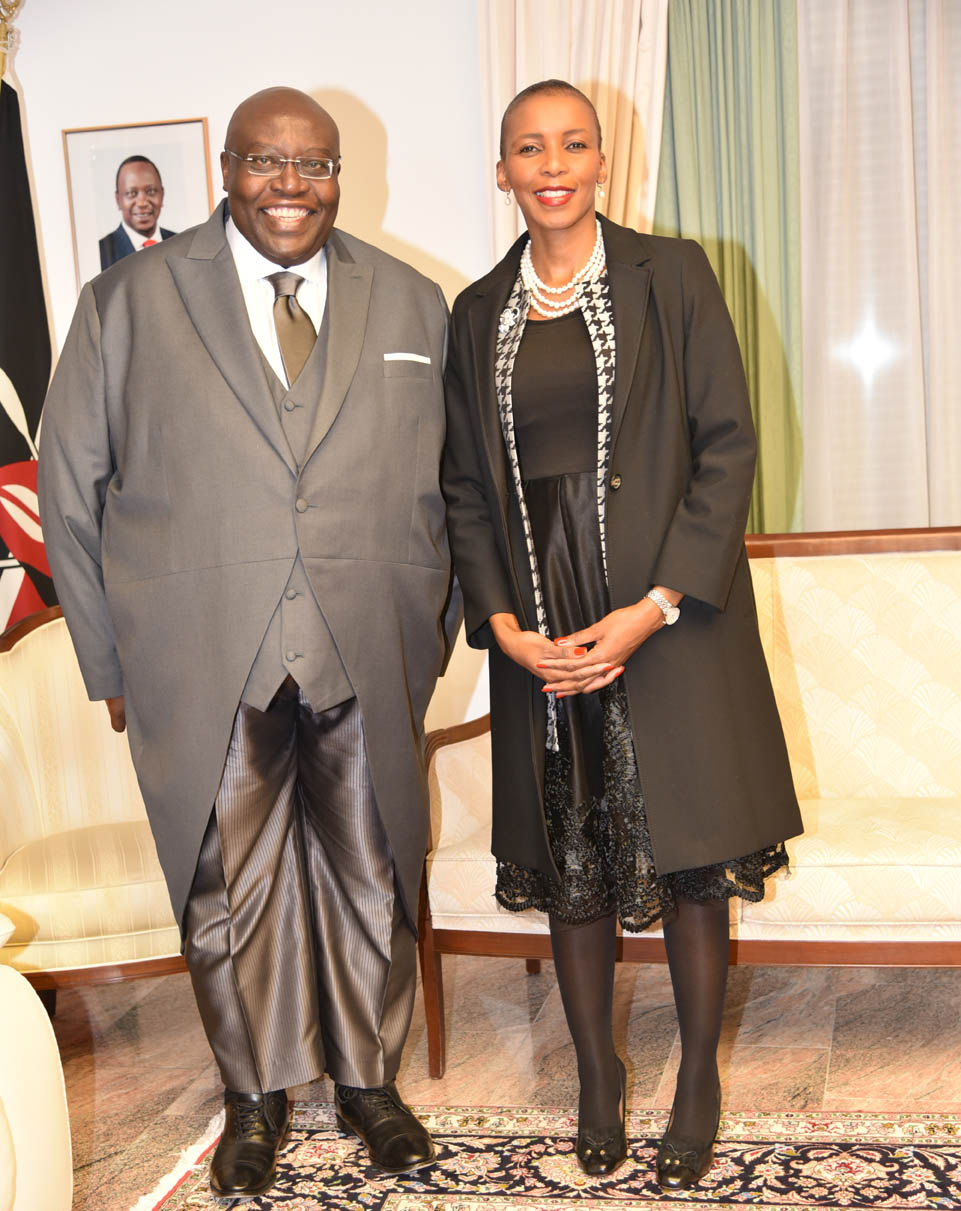
Ambassador Thomas Amola and his wife, Mrs Iris Matlhodi Kekana-Amolo
There is a long history of ties between Germany and Kenya. In fact, Germany was the first European country to establish diplomatic relations with independent Kenya in 1963. What is the state of Kenyan-German relations, 57 years on?
Incredibly huge! It has expanded, it has deepened and it has broadened. Not only in the territory of development cooperation – schools, hospitals, healthcare and agriculture, but especially now in the area of TVET, training for young men and women to enable them gain skills which they can take to the industry.
Secondly, in the area of business, the number of German companies in Kenya has moved from 8 or 10 in 1965 to 150 now.
A wider scope of understanding on the politics of the region and international politics exists now between the two countries.
During his visit to Germany in 2016, President Uhuru Kenyatta expressed his government’s commitment to increased economic relations between both countries. What has been achieved in that regard, five years on?
It was part of what we discussed today [with President Steinmeier]; on how to deepen, broaden economic relations between the two countries.
It is not only about German businesses investing in Kenya, but also Kenya as a springboard for investing in the wider East Africa region.
The numbers have increased definitely since President Kenyatta’s last visit, but we want more.
One of the key elements of Kenya’s engagement with German businesses is TVET. There is need for young men and women being able to acquire skills with their hands and being able to deliver them to industry. It has now become a critical tenet of German development co-operation.
Secondly, there has been an opening in trade and commerce. One of the things we have done to make Kenya an easier place to do business is to make it easier for companies to come in and settle down.
We also want Kenyan companies, especially SMEs being able to gain a foothold in Germany. They must not be big companies. They could be small enterprises being able to find market for their products in Germany.
We also would like to see what opportunities are there in the 16 federal states. We would like to see how things are being done in these states and connect them with our counties to share experience and knowledge.
We would like the states and counties to partner with the facilitation of the central governments.
We also would like to encourage the Blue Economy [economic activities related to oceans, seas and coasts] as Germany is a leader in that sector. We have been focused until now on the Green Economy – maize, tea, coffee, flowers etc.
We would like to expose KEPSA [Kenya Private Sector Alliance] to this market. We feel very strongly that there is more to be done in form of visits to increase contacts. It doesn’t have to be the big boys. It could be small and medium sized enterprises.
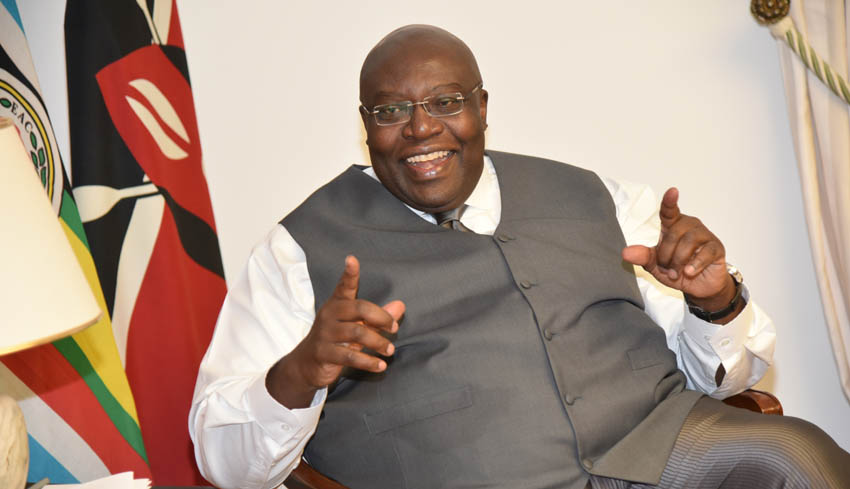
Economic diplomacy is a major function of diplomatic missions. What attractions does Kenya offer investors in Germany and how do you plan to communicate these to the business community here?
First of all, the basis for strong economic growth and development is a good environment of predictability. This means the governance system, which means democracy, which means an independent judiciary. We have been able to put that together over the years. So, there is a comfort level.
For example, an independent judiciary is particularly important because in case of dispute in the business sense you have an institution to which you can turn, and which can deliver justice.
President Kenyatta always says he is the no 1 economic seller of Kenya. So, he has given us a job in our territories to be the economic sellers of Kenya. So, I am the chief seller of Kenya for business, for trade, for tourism in Germany.
My job is to reach out to the various institutions that manage business, the various counties, the various federal states. To interact with the confederation of business.
We are lucky that over the years we have been able to build a capacity within the Embassy that has mapped out a plan which seeks to touch all these various provinces. What can we do with Baden-Wurttemberg? What can we do on tea, coffee? What can we do with where there are centres of excellence, where Mercedes-Benz is located? So, we are going to use the existing repository of knowledge and expertise in the Embassy to drive our outreach.
Facilitation of business is very important to us. We need to have a situation whereby our produce can reach the market directly and not through third or fourth parties. It requires a lot of leg work, quality contacts.
We want to build around our competence in agriculture, but we want to expand into services and see how we can start dealing in industrial products. I am pretty confident in Kenyan entrepreneurship.
And lastly, we have economic integration structures within Africa, within East Africa, within the continental free trade area. There is the possibility of leveraging these structures to enable Germany invest more in Kenya.
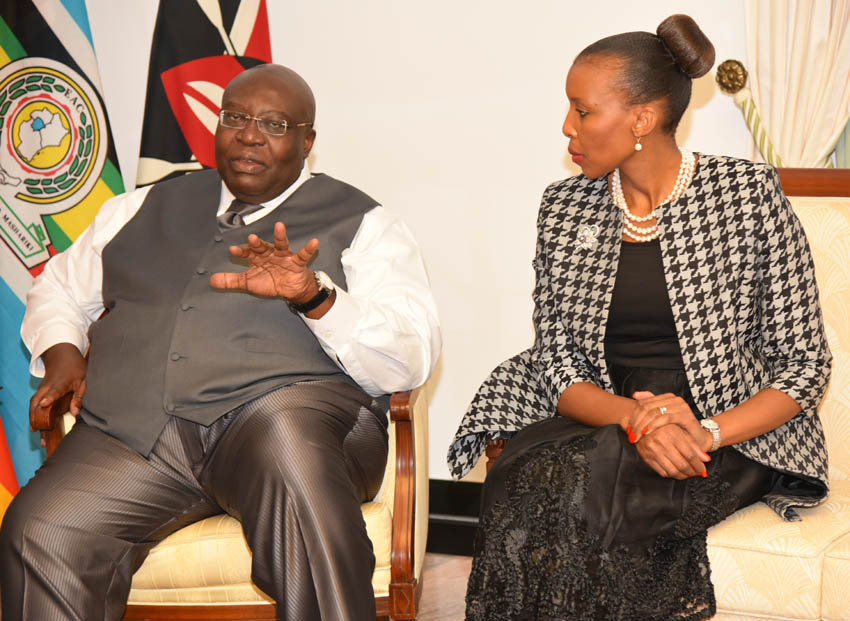
Germans are a major market for Kenyan tourism, a sector that has been adversely affected by the pandemic. How do you plan to win back German tourists?
Recovery is already happening. We have seen an uptake in bookings.
Kenya winning back the tourists would depend a lot on our management of the pandemic. When our infection numbers started going down, there was an uptake in bookings. We are already vaccinating. That sends out a message too.
It is important for us get the game right in addressing the Covid challenge. President Steinmeier told me today he was happy to note that we had started vaccinating in Kenya. When people feel confident to move around there is a natural desire to travel.
Also, we want to be creative about our products. Minister Najib Balala [minister of tourism] is very keen about taking Kenyans around their own country and showing them places they never thought of.
We are changing the impression of tourism as something that is coast related or about the animals of Masai Mara and Serengeti. There is more to tourism in Kenya than that. There’s need to create a greater awareness of a wide variety of tourism products Kenya has and to exploit them.
If we can open up minds and people’s perception to ourselves and to others including Germans, there will be an explosion.
We are hopeful that Germans who have been going to Kenya will keep doing so and younger ones would also join them.
The pandemic has negatively affected economies around the world. How is the Kenyan mission in Germany supporting your government’s efforts to overcome the post Covid-19 challenges?
Key to recovery is overcoming the pandemic. Firstly, we have to move away from vaccine nationalism. We must move away from the mindset that until all my citizens are vaccinated, I can’t give away what I have.
The COVAX initiative is working but it needs to be ramped up. President Steinmeier mentioned that when I talked with him about it. We agreed that there was a need to rapidly expand it.
Today is the first anniversary of the declaration of Covid-19 by WHO as a global pandemic. And since then, more than 2.5 million people have died. Hundreds of thousands have been incapacitated.
It is now time for the world to come together under the leadership of the WHO to lay down a plan on what we will do as a collective when the next pandemic occurs. It is inevitable that it will come, according to scientists.
I remember when His Excellency, President Uhuru Kenyatta spoke with Melinda Gates of the Gates Foundation recently; he told her that when Covid happened we had started moving well ahead of malaria, maternal health and other challenges. Now we have to take the resources away from these challenges and devote them to tackling the Covid pandemic.
So, there has to be a debate at the World Bank and other places on how to mitigate the ensuing resource gaps and how to support countries such as Kenya.
How do we ensure that developing countries also gain enough strength to take care of their citizens? How do we remove subsidies? How do we do away with obvious obstacles to trade? So, it is critical to rethink global economic structure that will enable us recover from the pandemic and thrive.
That is why we believe in Kenya that the rules-based ethos, that we have, has to be strengthened; it has to be fortified, it has to be buttressed by multilateralism. You can’t do it alone.
That is why in our activities in the African Union, in the East African Community and now in the Organisation of African, Caribbean and Pacific States we see our role as driving multilateralism.
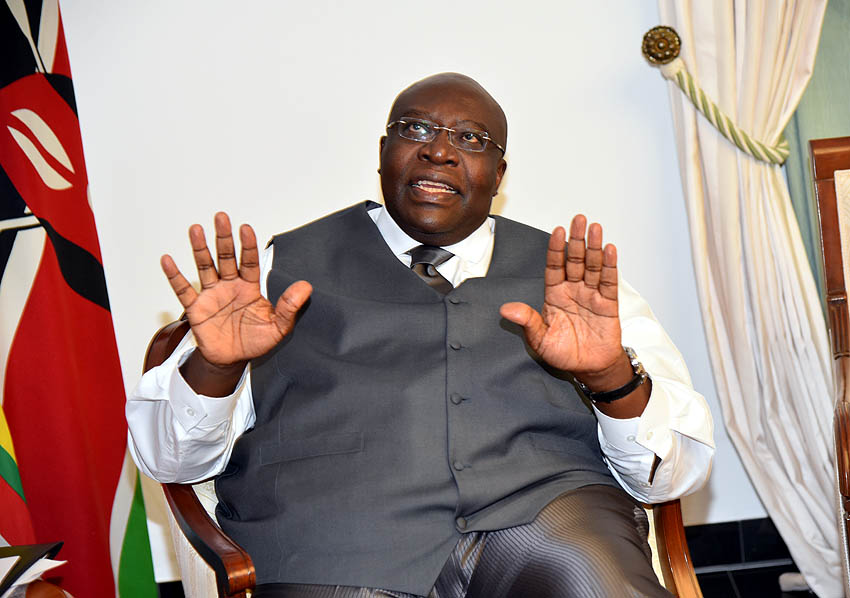
In view of financing gaps caused by the shifting of resources to address the challenges thrown up by the pandemic, would Kenya be appealing for more development assistance from your German partners?
I would like to talk in terms of partnership. President Uhuru Kenyatta always talks about partnership.
We are working together. It is in our interest to partner with those who have more. It’s in their interest to partner with those who have less. Because together we can build a wholesome whole.
Yes, Germany has plans to broaden their support for Kenya. We too have our own ideas and we have been able to sit down in the context of government-to-government relations to discuss them.
Kenya is currently a member of the UN Security Council. In what ways does your brief as ambassador advances Kenyan objectives in the Council?
Beautiful question! It formed part of our discussions with President Steinmeier today.
I was privileged and honoured to be part of the team that campaigned for Kenyan membership of the Council.
We had a 10-point agenda. Of these points, we distilled them to some critical ones – peace and security, climate change, women empowerment.
The Germans just left the Council, a year ago, and climate and security were their focus in the Council. On 9 March President Kenyatta chaired the African Union Peace and Security Council and he talked about the symbiotic relationship, of how the African Union and the UN Security Council have to work together. So, my job here is to expose German foreign ministry and leadership to our activities and efforts within the African continent.
Germany is a leader not only economically but also politically within the continent of Europe and globally. They have a reach which we can leverage to drive our agenda in the Security Council.
The Kenyan diaspora is naturally interested in seeing matters dear to them being given the needed attention by Your Excellency. Kenyans complain that when they call the embassy during office hours, their calls are rarely picked and that their emails are also rarely answered? Some also complain that they don’t always get consular assistance when they’re involved in police matters in Germany or Europe. Another issue of concern to Kenyans is their frustration with the e-visa application process. Some claim that emails don’t get through.
Sir, what are you going to do about these complaints?
I am not going to disagree, but I am going to say that I am the Chief Diaspora Officer of Kenya in Germany. So, here is my cell phone number 0173 603 1164 (WhatsApp & SMS).
Secondly, When I came to Berlin, my impression is that we have a good group of workers here. I also believe that the challenge that faced all of us in 2020 was the coronavirus pandemic. Even in Nairobi as we speak the office numbers have been reduced.
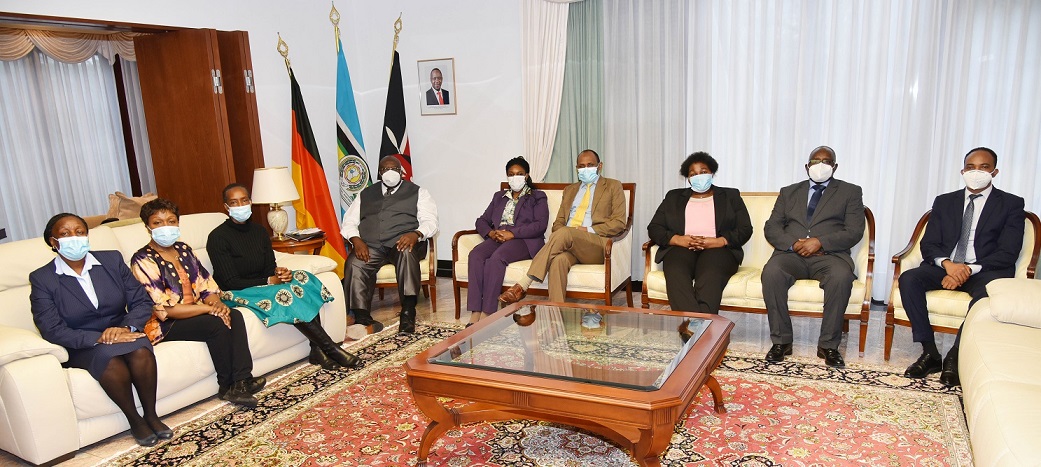
Ambassador Thomas Amolo and principal officials of the Embassy of Kenya in Germany
Ambassador Esther Mungai, who is my deputy, an able diplomat who has been running the show very well, has been able to pare down the numbers in our office. And we have to reduce the numbers further because the infection numbers are going up.
We have to obey German rules stipulating for example how many people can be in a room. So, we want to be creative within the bounds of German laws and also the responsibility to protect the health of Kenyans and our staff.
So, I beg my fellow Kenyans that whatever drawbacks they notice have to do with the situation we are dealing with; but we promise that, where we can, we will stretch out further.
I had a discussion with a group of Kenyan diaspora residents some days ago in my office and I made it clear to them that as Ambassador Extraordinary and Plenipotentiary, the only thing I can do is to sign on behalf of the government of Kenya. But that is it.
The real ambassadors of Kenya are the diaspora, they are the real ambassadors. Because on a day-to-day basis, they interact with Germans – with institutions, with the citizens. It means that you have to uphold the law. Do not break the law. If you break the law, you are not helping me.
I will always support Kenyans but to the extent of their legal happiness in the country. Our support for Kenyans is within the confines of the Vienna Convention on Consular Relations of 1961 [an international treaty that defines a framework for diplomatic relations between independent countries], which says that we have the right and the duty to visit any Kenyan anywhere to look after their interests. To do this means that you cannot run afoul of the law.
Please let us abide by the rules and you can count on my personal support and that of all my colleagues. Kenya is a rules-based country too. So, you cannot do whatever you like; you have to follow the laws.
We are working with the German government to ensure that we are able to serve our citizens without putting their health and that of our citizens working in the embassy in jeopardy.
We would like to make Berlin the home for documentation related to passport, marriage, IDs. We have already made the request. We want to be able to issue all these documents here.
Lastly, my track record in the US, in South Africa and in Nigeria, shows that I am very accessible, but do not abuse that accessibility.
What is your message to Kenyans in Germany?
Follow the rules, work with the Embassy, so that you can make your lives and our lives better! We are your partners.
 THE AFRICAN COURIER. Reporting Africa and its Diaspora! The African Courier is an international magazine published in Germany to report on Africa and the Diaspora African experience. The first issue of the bimonthly magazine appeared on the newsstands on 15 February 1998. The African Courier is a communication forum for European-African political, economic and cultural exchanges, and a voice for Africa in Europe.
THE AFRICAN COURIER. Reporting Africa and its Diaspora! The African Courier is an international magazine published in Germany to report on Africa and the Diaspora African experience. The first issue of the bimonthly magazine appeared on the newsstands on 15 February 1998. The African Courier is a communication forum for European-African political, economic and cultural exchanges, and a voice for Africa in Europe.
































